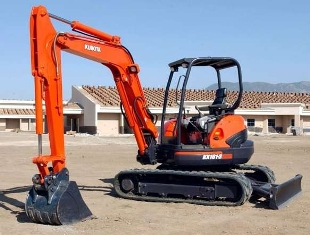The compact hydraulic excavator can be a tracked or wheeled vehicle with an approximate operating weight of 13,300 pounds.Normally, it includes a standard backfill blade and features an independent boom swing. The compact hydraulic excavator is also known as a mini excavator.
A compact hydraulic excavator is different from other types of heavy machinery in the sense that all movement and functions of the machine are accomplished through the transfer of hydraulic fluid.The work group and blade are activated by hydraulic fluid acting upon hydraulic cylinders.The rotation and travel functions are also activated by hydraulic fluid powering hydraulic motors.
Most types of compact hydraulic excavators have three assemblies – house, undercarriage, and the work group.

House
The house structure contains the compartment for the operator, engine compartment, hydraulic pump and also the distribution components. The house structure is attached to the top of the undercarriage via swing bearing. Along with the work group, them house is able to rotate upon the undercarriage without limit due to a hydraulic distribution valve that supplies oil to the undercarriage components.
Undercarriage
The undercarriage of compact excavators consists of rubber or steel tracks, drive sprockets, rollers,idlers, and associated components and structures.The undercarriage is also home to the house structure and the work group.
Work group
The work group consists of the boom, dipper or arm, and attachment. It is connected to the front of the house structure via a swinging frame that allows the work group to be hydraulically pivoted left or right in order to achieve offset digging for trenching parallel with the tracks.
Independent boom swing
The purpose of the boom swing is for offset digging around obstacles or along foundations,
walls, and forms. Another use is for cycling in areas that are too narrow for cab rotation. Another major advantage of the compact excavator is the independent boom swing.
Backfill blade
The backfill blade on compact excavators are used for grading, leveling, backfilling, trenching, and general dozer work. The blade can also be used to increase the dumping height and digging depth depending on it’s position in relation to the workgroup.
The most common place you’ll find compact excavators is in residential dwellings. When digging phone lines or other things, these pieces of equipment are very common for getting between houses. Due to their small size, they can fit almost anywhere.Over the years, the capabilities for compact excavators have expanded far beyond the tasks of excavation. With hydraulic powered attachments such as breakers, clamps, compactors and augers, the compact excavator is used with many other applications and serves as an effective attachment tool as well. Serving many purposes, the compact excavator is a great addition to any job that requires the use of machinery.
This article is submitted by – Er. Vikrant
If you have a query, you can ask a question here.



in think yours this site is very use full in the branch of civil engg. and also in the field of civl
this is wow
This page shows some very useful equipment, but you need more….how about motor graders, various pile driving equipment (vibaratory, reciprocating/impact), skid steer equipment, pavement grinding equipment, asphalt spreaders and compaction equipment, compactors, rotary mixing equipment for lime-treated base, etc.
Nice job yaar, all these informations are very useful mainly for engineering students
what r the equipment use for tunnel
sir, plz explain me…. what is modulus of elasticity of concrete?????? and it is depend on which factors?
what is the min dia of chairs to be used , if slab thickness is 350 mm and bottom bar 16 and top bar 12 mm